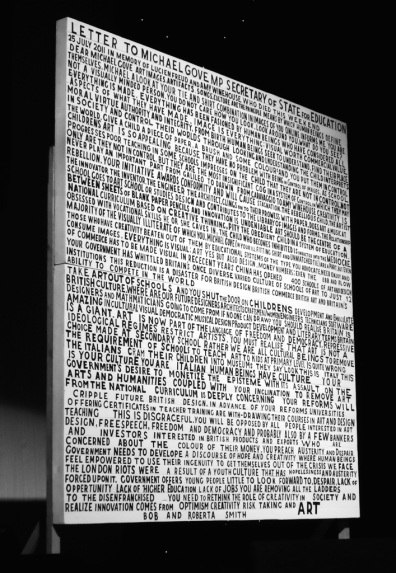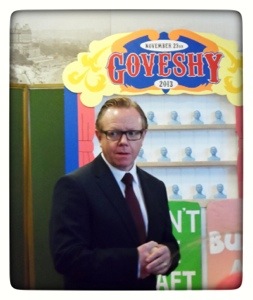 I have been trying to understand for some time now why it would make sense to force schools to take away subjects from their curriculum, particularly at Key Stage 4. I can totally understand the financial reasons that might cause a smaller school to not spread their GCSE curriculum too thinly if it meant that staffing needs were too expensive and class sizes made it unmanageable. However, the idea that some of the GCSEs were ‘soft’ and therefore needed to be replaced with super tough qualifications seems ridiculous. This is particularly the case when it comes to the edging out of the Arts, Drama and PE. I wonder whether anyone who is calling these subjects soft has actually sat and observed a lesson or two in any of these subjects. I have been fortunate to observe all of these subjects in the last year and have seen amazing work going on at GCSE level. I want to speak up for each of these subjects and then finish off by speaking up for the children that would take them.
I have been trying to understand for some time now why it would make sense to force schools to take away subjects from their curriculum, particularly at Key Stage 4. I can totally understand the financial reasons that might cause a smaller school to not spread their GCSE curriculum too thinly if it meant that staffing needs were too expensive and class sizes made it unmanageable. However, the idea that some of the GCSEs were ‘soft’ and therefore needed to be replaced with super tough qualifications seems ridiculous. This is particularly the case when it comes to the edging out of the Arts, Drama and PE. I wonder whether anyone who is calling these subjects soft has actually sat and observed a lesson or two in any of these subjects. I have been fortunate to observe all of these subjects in the last year and have seen amazing work going on at GCSE level. I want to speak up for each of these subjects and then finish off by speaking up for the children that would take them.
Firstly Art. I was lucky to be able to attend the Art Party Conference (@ArtParty2013) at the Scarborough Spa last weekend. It was an amazing gathering of artists and educators celebrating their talents and how important it is to have the opportunity for creative expression in the curriculum. The event was led by Bob and Roberta Smith and began with a protest parade across the sands with amazing banners shouting out for the need to have Art in education. Once within the Spa, Bob read out his letter to Gove (see photo)  and explained his reasons for encouraging creativity and the diverse range of occupations that would be damaged if thwarted. The day went on with performance artists, music and exhibitions all collaborating together to show just how amazing learning about art can be. Scarborough was buzzing with artists, teachers, students, performers, who came from all over the country with placards ready to join in the protest. What added to the fun was that we were graced with the presence of @Micha
and explained his reasons for encouraging creativity and the diverse range of occupations that would be damaged if thwarted. The day went on with performance artists, music and exhibitions all collaborating together to show just how amazing learning about art can be. Scarborough was buzzing with artists, teachers, students, performers, who came from all over the country with placards ready to join in the protest. What added to the fun was that we were graced with the presence of @Micha elGroveMP who took part in events bringing his own creativity and humour to the proceedings. I loved the Goveshy where G(r)ove took sneaky shoots at mini effigies of himself. The atmosphere was full of joy and yet the serious message of keeping art in schools was clear.
elGroveMP who took part in events bringing his own creativity and humour to the proceedings. I loved the Goveshy where G(r)ove took sneaky shoots at mini effigies of himself. The atmosphere was full of joy and yet the serious message of keeping art in schools was clear.
I loved Art in school, it was a whole different kind of concentration. It allowed an expression of ideas not possible in other subjects. There is some amazing work going on in schools these days. Thank goodness that Art in schools doesn’t look like Art in schools anymore. It has been opened up and the variety of artists studied, techniques developed and work produced is immense. Why there is a need to narrow that selection I do not know.
As well as observing Art I have been fortunate to observe Drama. As with Art, lesson observations are accompanied by a little hint of jealousy at the freedoms used in lessons to prompt different kinds of responses from the students. I have taught students who have gone on to be highly successful actors on stage and screen and have been proud to have been part of their educational journey. Their love of Drama began with school Drama. What I find incredible to even consider is the notion that Drama could ever be considered soft. I think in particular of an examination piece I watch a couple of years ago and yes it was A level and not GCSE, but it had required to the cast to interpret their piece and perform in the style of Brecht. During those performances I can safely say that the students were educating more than a couple of the adults watching those scenes.
Skills that are developed from lower down through GCSE to A Level include improvisation and adaptation. Even if students are not destined for a career in theatre just imagine how useful those skills are for speaking in front of others, not being thrown by unexpected events, managing people, thinking on your feet. To say that the analysis that goes on when watching professional productions is soft is another thing again. Teachers will know how difficult and demanding it is to ensure that students get good results on those aspects, because it is a very hard thing to do. The level of analysis needed is sophisticated and subtle and again is incredibly adaptable to other aspects of Iife.
Finally PE, again another subject I’ve been fortunate enough to observe. Now there can be little disputing the health benefits of children playing sport, but that is not what is being challenged at this particular point. What is sadly being challenged is pupils opportunity to specialise in sport. Does that make any sense? ‘Oh hello young person there, you seem to enjoy your sporting activities’, ‘I do indeed kind sir’. ‘You also appear to have a particular interest in playing sport and are able to play a couple of these sports well?’, ‘Yes indeed, that is correct’. ‘Well’, said the gentleman in the suit and glasses, ‘that looks rather too easy to me’, why don’t you go and learn how to code with computers instead, that would be far better for your simple little head’.
Now there is no way that I am against getting students to learn code in schools. Far better that then spend endless time on making spreadsheets, but there is no way that the PE is easy at GCSE level. The opportunities for cross curricular activities with Biology are frequent and good teachers have teemed up with science staff to produce some amazing lessons which reinforce knowledge in each subject. I always tried to refer to PE as Sports Science because there was so much information on what’s happening to the body, particularly for elite athletes. I saw lessons that capitalised on the fervour following the Olympics and analysed sporting performance in order to see what is needed to succeed at that level. Nothing soft about that. If you ever need convincing of the value of good PE teaching then trying to hear Alex Danson, Team GB Hockey, speak. I and all the other teachers in the room were so moved when she spoke of her love for the PE she studied at school and her desire to be a PE teacher. Outstanding.
Finally what about the students who take these subjects. I think that with a narrowed curriculum you have students who have a great range of strengths and talents all forced down similar routes. By taking these subjects out or narrowing their breadth you also take away the opportunity for those students to shine. Not everyone is interested in the same subjects. I have always been against children picking certain subject combinations because they feel they ought to. Instead I thinking there should be creativity, individuality and diversity. There are so many things in life we have to do as adults why not encourage those students who are going to do those subjects because they want to. It is so hard to discover your passion in life, a subject you love, why take away or narrow those options into unrecognisable alternatives. I’m all for individuality, who wants to be a clone? Far better to be your own person. The fact is that human beings are beautifully different,unpredictable creatures. If you want to raise standards then you need to do the hard work that teachers do on a daily basis. There are no short cuts and think about what it means when you describe these subjects as soft. Would you describe the people below as soft? No, I didn’t think so.







